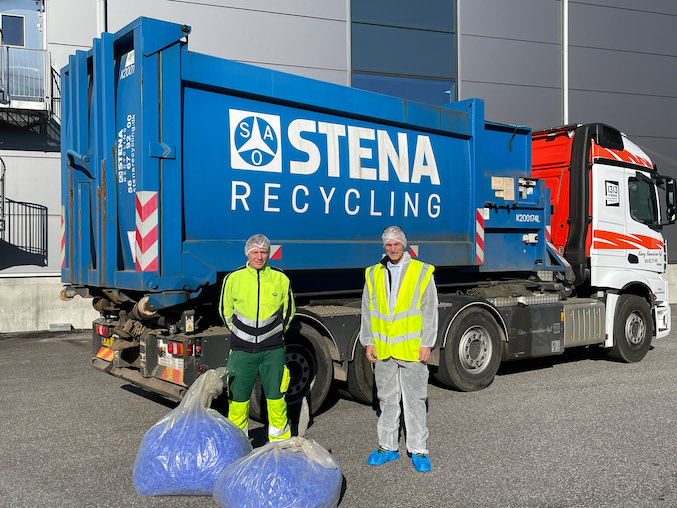Keeping plastics in circulation

Sustainability is a top priority at SÜDPACK in all areas and aspects - and is also a constant incentive to act. More than 50 percent of the company's investments go into technologies that help improve sustainability. 30 percent of sales are already generated with sustainable products. ZERO WASTE is the vision of SÜDPACK. One goal is therefore to support customers in closing cycles and reducing the consumption of fossil resources.
SÜDPACK sees chemical recycling as an important and indispensable part of a circular economy in the plastics industry. And always when mechanical recycling reaches its limits despite "Design for Circularity". Chemical recycling can be used to recycle multi-layer materials as well as contaminated and mixed plastics that cannot be recycled using mechanical recycling methods. For food packaging, SÜDPACK considers the combination of material and chemical recycling processes to be an ecologically and economically viable alternative. In this way, easily separable plastic fractions can be sorted out by sensors and recycled, while other material fractions can be processed into new goods through chemical recycling.
For this reason, SÜDPACK entered into a strategic cooperation with Carboliq two years ago. The primary goal was initially to use the pilot plant for the recycling of the company's own materials that accumulate during the production of packaging films. The first customer projects are now being implemented.
Arla Foods is exploring new ways to recycle plastic waste
Together with Arla Foods, SÜDPACK has developed a model to make the production of maturing bags for mozzarella cheese circular. By using the chemical recycling process, the plastic stays in the loop and is made into new packaging instead of being incinerated, reducing the overall use of fossil fuels and reducing the carbon footprint. The mozzarella cheese is made at Rødkærsbro Dairy in Denmark. It has to mature in specially designed maturing bags for about two weeks. For reasons of food safety, the plastic films must be multi-layered. However, this also means that they cannot be processed by mechanical recycling, as is standard across Europe. Therefore, until now they had to be incinerated after fulfilling their important role in the production process.
In order to achieve a higher recovery level and as part of Arla's commitment to improve the circular economy and reduce the use of fossil raw materials, SÜDPACK and the dairy cooperative are conducting a large-scale test in which 80 tonnes of plastic waste are converted into new packaging through chemical recycling .
"Rather than incinerating our plastic films, resulting in a one-off energy gain, we recycle them and use the recycled material to make new packaging. This reduces the carbon footprint and the need for new fossil fuels. It may sound obvious, but in the In the complex world of recycling, this is an exciting step on our journey towards fully recyclable packaging," says Grane Maaløe, Lead Packaging Development Manager at Arla Foods.
keep plastic in circulation
Even if the maturing bags were suitable for mechanical recycling, the recyclate should not come into contact with food again. As a result, instead of being recycled as new food packaging, the films would be downcycled and used elsewhere, leaving the loop.
"By using the capacity of Carboliq, our chemical recycling facility in Germany, we can ensure that the films made for Arla's cheese aging do not go out of the loop but are recycled into new packaging. A ton of mixed plastic does not equal a ton of new packaging, but it reduces the need for fossil raw materials and paves the way for further investments in this infrastructure," says Dirk Hardow from SÜDPACK.
Taking into account the loss of electricity and thermal energy that occurs during incineration and the negative effects of transporting the films from Denmark to Germany, the calculation on which the test is based still favors chemical recycling when it comes to the total carbon emissions goes. Up to 50 percent fewer emissions are emitted per tonne of plastic waste when it is completely processed, including chemical recycling, than when it is incinerated. SÜDPACK and Arla Foods are currently conducting a test with 80 tons of plastic film from Rødkærsbro Dairy. After completing and evaluating the test, they will plan the next steps.
About SÜDPACK
SÜDPACK is a leading manufacturer of high-performance films and packaging materials for the food, non-food and medical goods industries. Our solutions ensure maximum product protection and other groundbreaking functionalities with minimal material entry. The family business, which was founded by Alfred Remmele in 1964, is headquartered in Ochsenhausen. The production sites in Germany, France, Poland, Switzerland, the Netherlands and the USA are equipped with the latest plant technology and manufacture according to the highest standards, including under clean room conditions. The global sales and service network ensures close proximity to customers and comprehensive technical support in more than 70 countries. With the state-of-the-art development and application center at the headquarters in Ochsenhausen, the innovation-oriented company offers its customers an optimal platform for conducting application tests and for developing individual and customer-specific solutions. SÜDPACK is committed to sustainable development and takes its responsibility as an employer and towards society, the environment and its customers by developing very efficient and sustainable packaging solutions.
